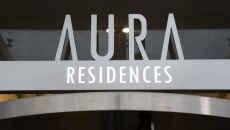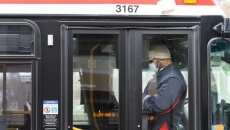OTTAWA - Prime Minister Justin Trudeau says the federal government is talking to provinces and territories about new standards for the quality, design and operations of long-term care homes in Canada.
The Health Standards Organization released updated standards Tuesday that say residents should get at least four hours of direct care every day.
The standards from the panel of experts at the non-profit standards organization also say those who work in those residences must be paid more.
On Tuesday, the prime minister said he recognizes that long-term care falls under provincial jurisdiction, but all Canadians want to see seniors' care held to the highest standard possible.
"That's what we're going to continue to work on," Trudeau said on his way into a meeting with his cabinet ministers.
Experts with the non-profit organization said the new standards will only be useful if the government puts them into practice and makes sure they are followed.
"These standards are only useful if … they become the basis of enforcement and accountability measures, not only accreditation measures," said Dr. Samir Sinha, the chair of the technical committee that developed the updated standards.
The organization issued the updated guidance for operating care homes in light of the deadly and tragic toll the COVID-19 pandemic took on Canadian residents and their quality of life.
The authors say the ball is now in the government's court.
"The standards themselves can become the basis of legislation, they could come the basis of policy and other measures of accountability," said Sinha.
Long-term care as a health service falls under provincial jurisdiction, and there is a patchwork of rules across the country that govern how the homes should be designed, operated and maintained.
Typically it would be up to provincial governments to mandate the standards if they choose, but in the 2021 election Prime Minister Justin Trudeau promised to legislate safety in long-term care across the country.
The Liberals doubled down on that promise as a condition in their confidence-and-supply agreement with the New Democrats, which would see the opposition party support the minority government through key votes in the House of Commons to prevent an election until 2025.
Health Minister Jean-Yves Duclos said the government plans to start consultations on that legislation in the "coming months," but he has not said what that legislation would entail.
"The development of those standards complements our collaborative work with provinces and territories to help support improvements in long-term care," Duclos said in a statement.
Some provinces already require long-term care homes to be accredited according to the organization's standards, while other homes seek accreditation voluntarily.
The Health Standards Organization expects about 68 per cent of long-term care homes will be accredited on a voluntary or mandatory basis using the updated standards.
But Sinha said accreditation will not be enough without enforcement.
"As long-term care falls under provincial and territorial jurisdiction, any legislation will be designed in a manner that reflects jurisdictional responsibilities," Health Canada spokesperson Tammy Jarbeau said in a statement.
The government set aside $3 billion in the 2021 budget to help provinces and territories apply standards to long-term care, top up wages, and improve staff to patient ratios.
Much more money will likely be needed to implement the standards, however. In 2021 the parliamentary budget officer estimated it would cost an additional $4.3 billion per year just to expand the number of hours of daily care to the four hours listed by the Health Standards Organization.
Long-term care home employees are also not paid on par with other health workers.
"If you were working in a long-term care home, you're probably making significantly less than you would as a personal support worker, as a nurse, as an occupational therapist, as a social worker … working in a publicly funded hospital," Sinha said.
Labour shortages were a key factor in the devastating situation that played out during the early days of the pandemic as staff struggled to provide adequate care, and Sinha said the problem persists today as care homes cope with COVID-19 and flu outbreaks.
New guidelines for the design of long-term care homes and practices to prevent infection were developed in tandem with the updated care standards. They were released last month by the CSA Group, formerly known as the Canadian Standards Association.
The CSA Group standards cover everything from the number of residents who should share a room to the materials used to construct the building.
The CSA Group standards are strictly voluntary at this point, but the experts who developed those building standards hope they will be adopted into regulations quickly.
"Time is of the essence as there are plans across the country, in various provinces and territories, to build new long term care homes," said Alex Mihailidis, who chaired the CSA Group committee.
"Our hope is that they will be looking at our standard for before the shovels are in the ground."
Mihailidis believes if the standards were in place when COVID-19 struck in 2020 fewer things may have fallen through the cracks, but until the new guidelines are in place and enforced, he said it's still a matter of waiting to see.
"It's definitely a big step in the right direction," he said.






